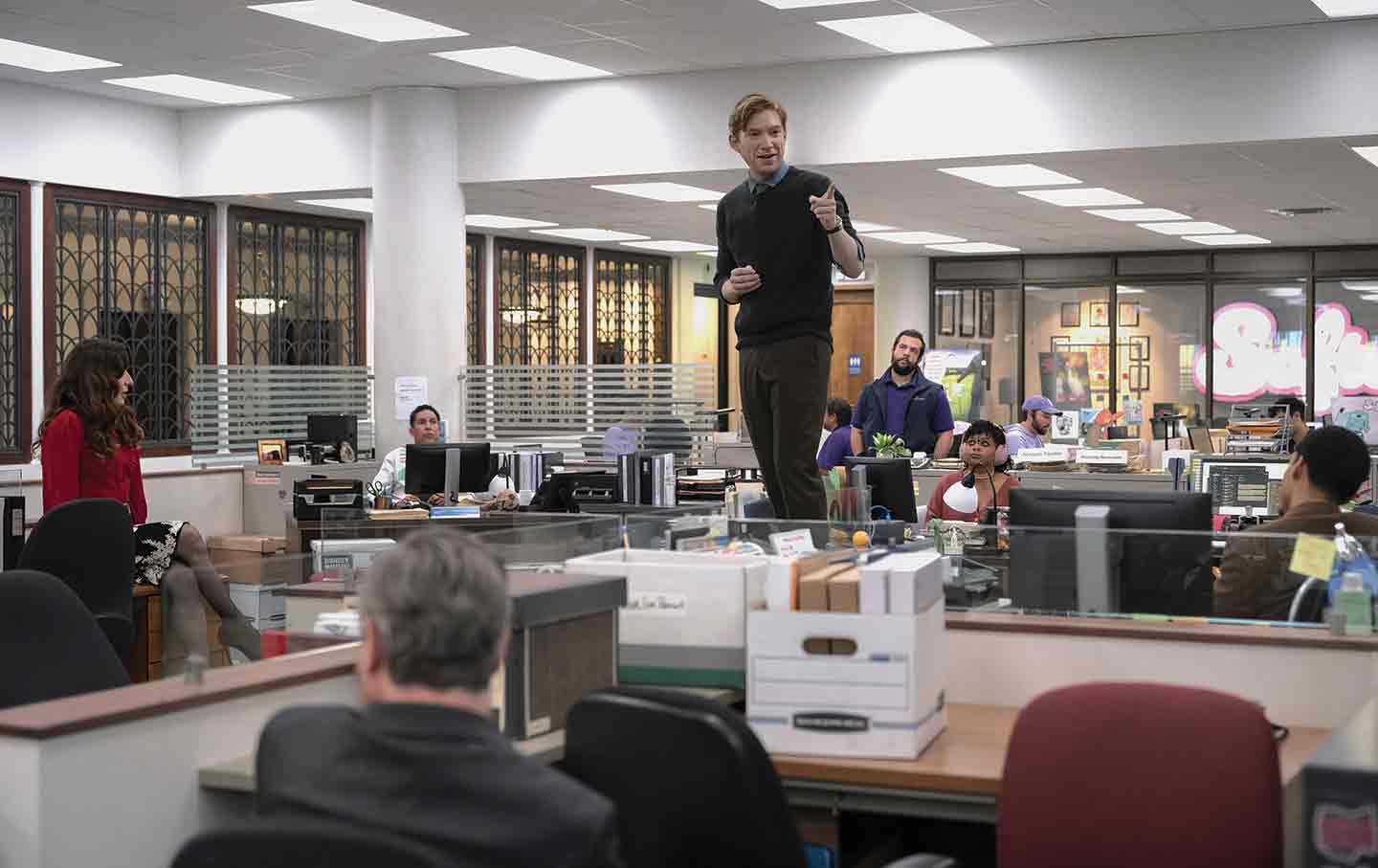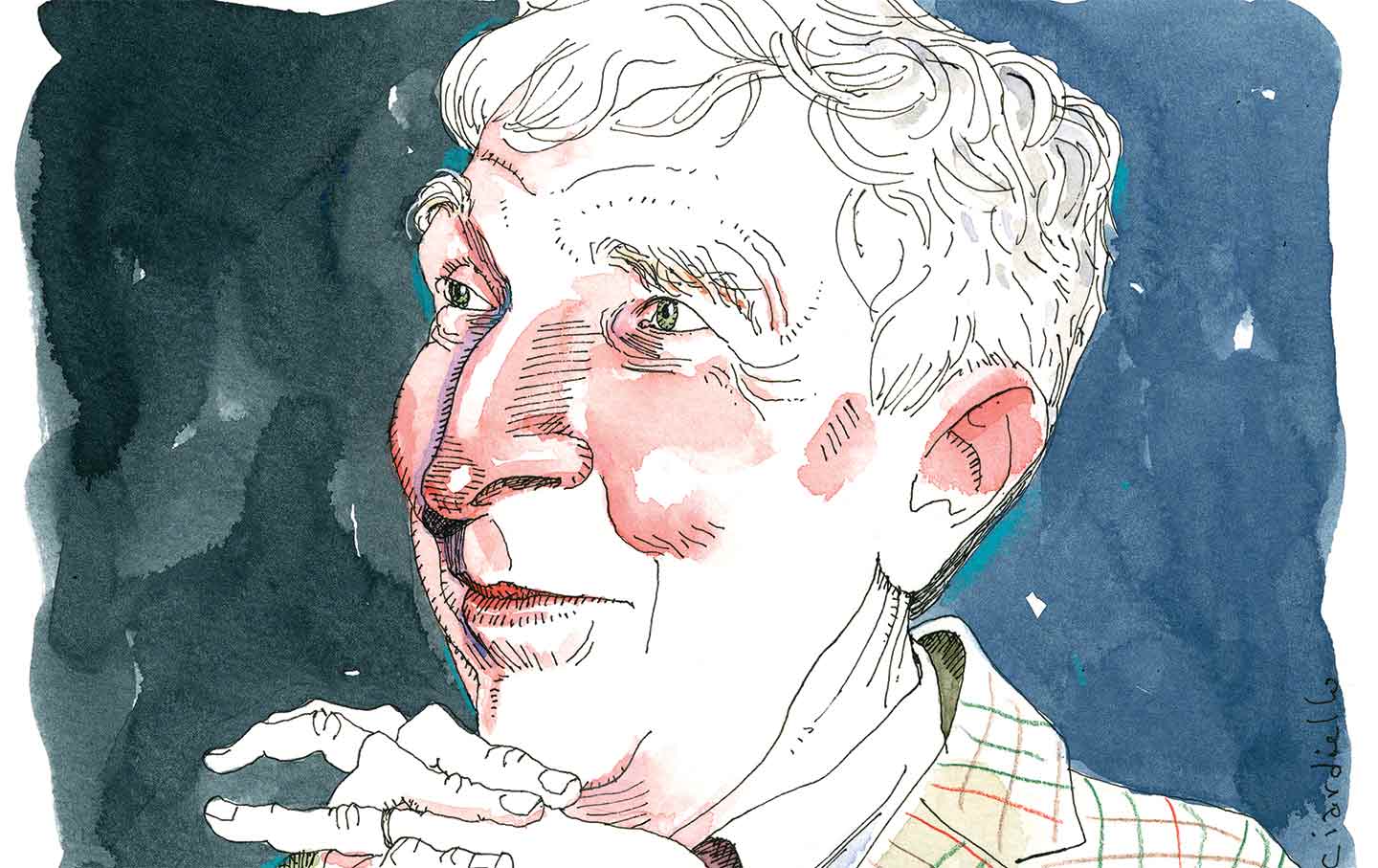Can Babygirl Breathe New Life Into a Retrograde Genre?
Can “Babygirl” Breathe New Life Into a Retrograde Genre?
The movie, starring Nicole Kidman, operates at the level of the female gaze. Its inversion of erotic thriller tropes leads to fascinating but, at times, tepid results.

The surfaces of Romy’s life are smooth. The protagonist of Halina Reijn’s Babygirl, played by Nicole Kidman, is the CEO of a robotics company named Tensile, launching a line of warehouse robots that glide on gridded tracks, fulfilling orders more frictionlessly than any human ever could.
Her face, made taut by Botox and filler—lit by the glow of an iPhone, staring out of a cryotherapy chamber, or peering into an EMDR therapy light—is flawless. She gets through her days efficiently with the help of her assistant, Esme (Sophie Wilde), and wraps herself in the smooth shell of a cashmere coat to return home to a cavernous modern apartment. Her domestic life runs with artful precision: She tucks handwritten notes on Tiffany-blue paper in her children’s school lunches, manages schedules, hosts birthday parties. She emotes little, but fakes perfect, porny-but-not-too-porny orgasms for her theater director husband, Jacob (Antonio Banderas).
Disruption comes in the form of Samuel (Harris Dickinson), a young man whom she watches calm an aggressive dog on the street outside her office and, later that day, meets as one of her company’s new cohort of interns. From the start, Samuel sneaks small challenges into their every interaction, testing boundaries in a way that could appear flirtatious, insubordinate, or off-putting, depending on the receiver. (Memorably, he sends her a glass of milk during a company happy hour, daring her to drink it.) Romy is taken aback, but his overtures work for her; she’s intrigued. Eventually, she accepts his invitation to meet him at a seedy hotel, where they begin a dominant/submissive sexual relationship, with Romy in the role of the sub.
The affair and its consequences inevitably play out, with the relationship evolving into a riskier, more entangled arrangement. After Samuel shows up at Romy’s home to drop off her laptop, she calls it off, insisting that she wants to protect her family, but the affair resumes, and Jacob eventually learns of it. It’s important that no one at Tensile knows, but someone figures it out. Romy understands how bad things can get the longer she stays with Samuel, but she chooses to keep going—a decision that seems more and more reasonable as the film goes on without the stakes of the relationship substantially changing.
For its subject matter, Babygirl is an oddly timid film, owing in large part to Reijn’s attempt to fit so many ideas in the zeitgeist into it—the expectations of women in power; intergenerational conflict; age-gap relationships; discomfort with the sexuality of older women; whether sexual kinks are innate or the product of trauma; and, on top of all that, AI and the future of humanity—that none have the space to go anywhere especially juicy or shocking. Amid the film’s muddle is a more modest success: some scenes and ideas that sketch out a new form for a retrograde genre, the erotic thriller.
In an interview with NPR, Reijn cites the slinky, vaguely sleazy blockbuster erotic thrillers of the 1980s and ’90s as an inspiration for Babygirl—9½ Weeks, Indecent Proposal, Basic Instinct. The films are, in her description, a kind of problematic comfort watch; they are fun, sexy, but impossible to separate from the outdated sexual mores they express. Shot from a voyeuristic male gaze, they often end in death or disaster for the woman as a form of narrative punishment for their deviance, which is, in ’90s terms, more or less equivalent to female sexuality in general. With Babygirl, Reijn wanted to craft an alternative: an erotic thriller shot from the female gaze, without fear of sexually uncontrolled women propelling the plot.
In this sense, Babygirl inhabits largely uncharted territory, and some of the results are fascinating. Kidman plays Romy as a taut cord, a muscle stiffened by the tension of suppressing what she wants, which gives her arc over the course of the film a therapeutic or recuperative tone. In Romy and Samuel’s first encounter in the hotel room, they begin testing out what the other wants, backing off, starting over; there are a couple of moments when you feel that Romy really might give up and leave. Later, as Samuel brings Romy to orgasm, the camera stays locked on her face, on the floor, as she squirms and buries her head in her hands and makes guttural, raw sounds—it’s awkward and anthropological more than titillating, which successfully jars you out of the tropes of onscreen sex. If the camera in a traditional erotic thriller takes the perspective of the male lover or the male voyeur peeking through a keyhole, in Babygirl, it’s something else. Not a woman enjoying sex; it’s closer to a doula, kneeling next to Romy’s head while she experiences something outside of her immediate capacity to process.
Retaining this awkwardness, this friction, makes for a more compelling portrait of an unconventional relationship. At work, Romy gives orders and they’re carried out; here, it’s a messier process. She receives orders, argues, disobeys, scoffs, takes some directions and not others, and Samuel, as the dom, adjusts. Romy performs powerlessness, but the real frisson in the relationship comes from this negotiation: feeling out whether the demand will be too much or not enough, and what will happen when a serious disjuncture appears. The film loses momentum once these disjunctures become repetitive and low-risk (when Samuel asks for a safe word, Romy chooses her husband’s name, an incredible setup that goes nowhere), but at first, it’s electric.
There’s an implication that youth manages the cognitive dissonance of unstable power dynamics more adeptly or more naturally than Romy and Jacob’s generation. It comes through as slapstick when Jacob has a panic attack after Samuel contradicts his view on BDSM relationships—that submissiveness is nothing more than a male fantasy projected onto women—as “a dated idea of sexuality.” When Esme blackmails Romy into a promotion and support for a leadership initiative for women that she’s been pitching unsuccessfully to upper management, there’s no sense of glee or villainy, just a kind of Machiavellian pragmatism. “I have no interest in taking you down,” she tells Romy. “You’re one of the few women who made it to the top. My interest is in keeping you there, not as you are now, but as a version of you I can look up to.”
Babygirl hints, probably optimistically, that it’s looking toward the future, between its Gen Z sexual prodigies, human-replacing robots, and workplace empowerment initiatives. “As more and more artificial intelligence is entering into the world, more and more emotional intelligence must enter into leadership,” Romy says brightly in a corporate video announcing the launch of a new product. If that emotional intelligence has an avatar in the film, it’s Samuel—Reijn presents him as preternaturally intuitive, gifted in sensing what others want and knowing how to use it to either disturb or calm them. But he remains a cipher; all we learn about his interior life is that his father is a boxer turned philosophy teacher and that he sometimes scares himself. In the end, Samuel disappears from the film as suddenly as he appeared—if this were a ’90s erotic thriller, you might be tempted to guess that he was a figment of Romy’s imagination the whole time, a hunky, tattooed manifestation of her repressed desires.
There’s plenty of ambivalence and eroticism and humor in the new world Romy confronts; the problem is that Babygirl never clears enough space to explore it. Romy is the CEO of a robotics company in the same way that the protagonist of a Hallmark Christmas movie is a high-powered executive. It establishes the archetype she belongs to (“boss bitch”), and that’s the extent of its significance—the machines remain off-screen, in the warehouse. Tensile’s workplace scenes were shot in the New York office of A24, the film’s production company, clad in mid-century-modern wood paneling and teals and oranges, more fitting for an entertainment company than a futuristic tech startup. (“When they moved offices, they gave me this tour,” Reijn says. She recalls “really falling in love with the office” and feeling that she “could really see Romy walking around there”; it didn’t hurt that it saved the production money on location rentals.)
Late in the film, Samuel invites Romy to an underground rave. She shows up in an outfit she could wear to the office: a saffron-colored silk blouse and heels, the kind of clothing no one else at the warehouse party is wearing. She is clearly out of place, stricken by the crowd of sweaty, makeup-smeared bodies. As she fights her way through to Samuel, a shot from overhead shows the crowd massing and colliding under strobe lights as it pushes the two together. The shot parallels an earlier scene of Tensile’s fulfillment robots gliding evenly along their optimized routes, also shot from above. The framing is the same, the goal is the same—picking the one thing, the one person you need out of the mass—but the images couldn’t be more different. The contrast between them indicates something about Romy’s journey: Perhaps she’s learning that some things only happen when you take the path through human mess rather than streamlining it out. But by this point in the film, with not much run time to spare, I’d forgotten about the robots; I was tracking the kids, the assistant, the investors, and whether Jacob’s production of Hedda Gabler is any good.
During one of their fights, Jacob asks Romy, “Am I relevant to you as a director?” Instead of mollifying him by affirming his importance, she laughs dryly. “We are all irrelevant,” she replies. “We have to pay more attention to the avalanche that is going to cover us very soon.” It’s a great erotic-thriller line—campy, over-the-top, portentous, and a little creepy. I want to know what avalanche she’s talking about. Climate change? Artificial intelligence? Or the inevitable march of time—aging, death? Whatever the answer, it would tell you a lot about who Romy is. You never do find out.








